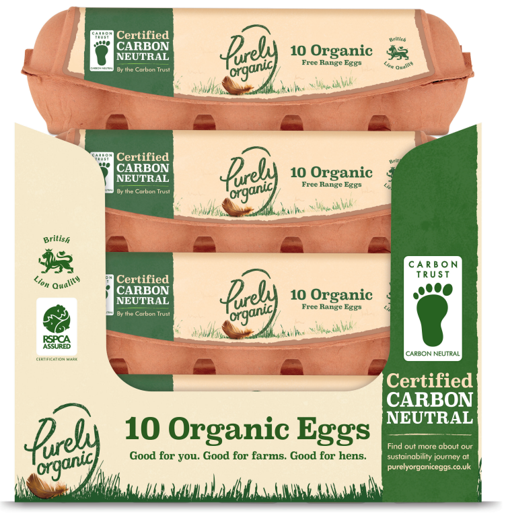Noble Foods’ Purely Organic egg brand achieved carbon-neutral status in July, but as Michael Barker finds out, that’s just the start of the company’s sustainability ambitions
In the race to net zero, Noble Foods hit a notable milestone in July when it announced it had achieved carbon-neutral status for its Purely Organic egg brand following accreditation from the Carbon Trust. The achievement is a significant one for the business, and is a welcome good news story at a time when the industry is battling a plethora of challenges from avian flu, to input cost hikes.
Noble Foods’ group environmental manager Glenn Evans explains that carbon neutrality has been achieved in around 15 months and was born out of work the company was doing with on-farm environmental assessment business Alltech E-CO2. “We realised this was something we could go for,” Evans recalls. “So we started footprinting in earnest around about May of last year, initially on 13 Purely Organic farms. With other products you would just measure a calendar year but with poultry you have to use a flock, which is 70-odd weeks, to make it more accurate.”
Measuring and reducing a company’s carbon footprint is not a straightforward exercise in poultry. Feed is the cause of as much as 70-80% of all emissions associated with poultry farming, according to Evans, and that’s before you factor in packing and onward distribution to retailers. Soya is a particularly tricky input from a sustainability point of view, so Purely Organic has been reducing airmiles by sourcing alternative raw materials closer to home.
In its work with the Carbon Trust, Noble even went as far as looking at consumer egg usage in terms of how they are cooked and disposed of. “It’s a real case of cradle to the grave,” Evans adds.
Carbon footprinting is still in its infancy and that can give it a certain lack of clarity, particularly in terms of how to measure and benchmark progress. In order to gain legitimacy for its claims, Evans says it was crucial to work with the Carbon Trust.
“When we started to look at this in terms of providers for certification, we knew that the Carbon Trust is probably the most recognised label on product,” he says. “But then there’s also the fact that they are true gold standard operators in this area – the rigour that they go to in terms of assessment was really important to us, given the fact that Purely Organic has got good environmental credentials anyway. We didn’t want to be aligned with any sort of greenwashing or anything like that.”
Expanding on the point, Evans points out that the Carbon Trust scrutinises a business’s full sustainability strategy and won’t simply let anyone buy themselves an environmental halo. “The Carbon Trust’s first remit is the fact that you have to have a proper carbon reduction plan and that any residual emissions can be offset, rather than it just being business as usual and paying the money for offsetting. That’s not what they’re about,” he adds.
That credibility is vital given the scrutiny brands rightly come under for their claims. Noble Foods is promoting the achievement with redesigned packs prominently featuring the words ‘Certified Carbon Neutral’, backed by in-store shopper marketing and digital media activity.
It’s too early to say whether the learnings from the Purely Organic exercise will be rolled out to the company’s other lines, but it’s safe to assume that the learning process will feed into the wider sustainability piece. There’s plenty of work to do, particularly as the business is in the process of the huge job of establishing its Scope 3 (supply chain) emissions, an undertaking that involves collating the emissions of over 200 supplier farms.
A key priority right now is signing up to the Science Based Targets Initiative (SBTI), a process that gives businesses the opportunity to create a clearly defined pathway to reduce greenhouse gas emissions.
“If you have a net-zero ambition, then that is the organisation that you would sign up to,” Evans explains. “They can then vet that your ambitions are credible and they also give you a year-on-year target to get to that final net-zero level.”
Collating that Scope 3 emissions data is an important part of the process, and the hope is that Noble will be ready to sign up to SBTI by the end of this year or soon after. Noble hasn’t yet published a defined net-zero target date. But the Purely Organic work is another prong in its wider environmental and sustainability drive, which is focused on the three core areas of energy, waste and biodiversity. Evans points out that Noble has upped its recycling rates from 50% to 70% – outperforming Defra benchmarks – and has been carrying out ecology surveys in collaboration with agricultural consultancy ADAS with a view to having biodiversity action plans in place for all Noble-owned sites by 2025. Bug hotels, bird boxes, woodland planting, and more, add
to the overall picture.
There’s also an acceptance that some things have to be done for reasons that go beyond pure profit. “We know it is going to require a lot of investment to get to net zero,” Evans says. “The NFU have already set out their pledge in terms of 2040, and a lot of retailers are doing the same in terms of that or 2035, so no doubt there are going to be pressures in terms of raising funds but there is also the question of how much consumers can take at the same time, as we are all feeling the pinch.
“There’s going to be elements of this where there’s a payback long term for the planet and for the business, and all the costs can’t be passed back on to the consumer. So it’s got to be the will of the business to do the right thing at the end of the day.”


